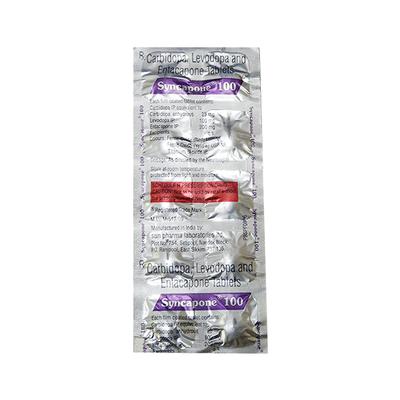

Netmeds First Membership
Quick Links
Introduction About SYNCAPONE 100MG TABLET
SYNCAPONE 100MG TABLET is a combination of Carbidopa, Levodopa and Entacapone, which belongs to the group of medicines called Anti-parkinsonian drugs. It is used in the management of Parkinson’s disease. Parkinson's disease is a disorder affecting the brain, causing unintended or uncontrollable movements, such as shaking, stiffness and difficulty along with balance and coordination. It usually starts gradually and worsens over time. As the disease progresses, people have difficulty walking and talking.
While taking SYNCAPONE 100MG TABLET for the long term, your doctor may suggest some regular laboratory tests. SYNCAPONE 100MG TABLET is not recommended for use in patients with severe liver disease, narrow-angle glaucoma, adrenal gland tumour, history of neuroleptic malignant syndrome and non-traumatic rhabdomyolysis.
Before taking SYNCAPONE 100MG TABLET, inform your doctor if you have asthma or any other disease of the lungs, kidney, heart and mental health diseases. SYNCAPONE 100MG TABLET is generally not recommended for use in pregnant women, breastfeeding, children and adolescents (below 18 years of age).
The common side effects of SYNCAPONE 100MG TABLET are uncontrolled movements, nausea, reddish-brown, discoloured urine, diarrhoea and muscle pain. If any of these become worse, contact your doctor.
Uses Of SYNCAPONE 100MG TABLET
- Manage Parkinson’s disease
How SYNCAPONE 100MG TABLET Works
SYNCAPONE 100MG TABLET is a combination of Levodopa which gets converted to dopamine, a chemical messenger that controls movement in the brain. Carbidopa manages the breakdown of Levodopa by allowing it to enter the brain for increased dopamine levels and Entacapone maintains the level of levodopa in the blood. All these collective actions provide greater relief from the symptoms of Parkinson’s disease.
How to use SYNCAPONE 100MG TABLET
Take SYNCAPONE 100MG TABLET as advised by your physician. Swallow the medicine with a glass of water. Do not crush or chew the medicine. The correct dose and duration for you will be decided by your doctor, depending on your age, body weight and disease condition. Do not stop taking SYNCAPONE 100MG TABLET without your doctor’s advice.
Side Effects Of SYNCAPONE 100MG TABLET
Common
- uncontrolled movements
- nausea and vomiting
- reddish-brown discoloured urine
- diarrhoea
- muscle pain and cramps
- light-headedness or fainting due to changes in blood pressure
- dizziness, drowsiness and tiredness
- abdominal pain and discomfort, heartburn, dry mouth, constipation
- inability to sleep, abnormal dreams (including nightmares)
- mental confusion and seeing or feeling imaginary things
- memory problems, anxiety and depression (possibly suicidal thoughts)
- chest pain, irregular heart rate or rhythm
- more frequent falling
- pallor skin and shortness of breath
- increased sweating and skin rashes
- swelling of legs
- blurred vision
- weight loss
- headache, joint pain
- pelvic pain, increased urge to urinate, irritation while urinating and blood in the urine
Uncommon
- tightness or pain in the chest, which spreads to the neck, back or arms
- black or tarry stool, blood in vomit and abdominal cramps (signs of gut bleeding)
- changes in the blood cell count which may result in bleeding,
- abnormal liver function tests
- convulsions
- agitation, disorganised behaviour, restlessness
- discoloured skin, nails, hair and sweat other than urine
- swallowing difficulties
- inability to urinate
Rare
- yellowing of skin or eyes, nausea, abdominal pain, fatigue, fever. dark urine, light-coloured stools
- itching
Stop taking SYNCAPONE 100MG TABLET and contact your doctor immediately if you experience any of the following side effects:
- signs of neuroleptic malignant syndrome or rhabdomyolysis (a rare severe reaction to medicines used to manage disorders of the central nervous system causing your muscles to get very rigid or jerk violently, tremors, agitation, confusion, fever, rapid pulse or wide fluctuations in your blood pressure)
- signs of an allergic reaction (nettle skin rash, itching, rash, swelling of your face, lips, tongue or throat, causing difficulties in breathing or swallowing)
- strong impulse to gamble excessively despite serious personal or family consequences
- altered or increased sexual interest and behaviour
- uncontrollable excessive shopping or spending
- eating large amounts of food in a short time or eating more food than needed to satisfy your hunger
How To Manage Side Effects
Nausea or vomiting:
Take SYNCAPONE 100MG TABLET along with medicine or just after meals. Stick to simple meals and avoid eating oily or spicy foods. If there is no improvement, contact your doctor for advice.
Heartburn:
Eat smaller meals at a regular frequency. Do not rush while eating and go for small walks after a heavy meal. If there is no improvement, contact your doctor for advice.
Constipation:
Consume plenty of foods rich in fiber, such as fresh fruits, vegetables and cereals and drink plenty of water. Try to exercise more regularly. If there is no improvement, contact your doctor for advice.
Diarrhoea:
Drink lots of fluids, such as water or fruit juice, to keep yourself hydrated. Do not take any medicine on your own without consulting your doctor.
Stomach pain:
Take a break to relax. Try to eat and drink slowly and in smaller portions. Keep a heating pad on your stomach. If there is no improvement, contact your doctor for advice.
Headache:
Try to relax and rest yourself. Apply pain balm to the head to ease off the pain. Sip on some hot water or ginger tea. If there is no improvement, contact your doctor for advice.
Dizziness:
Sit down or lie down slowly when you are feeling dizzy. Take some time to rest and drink plenty of water. Avoid coffee and other carbonated drinks. If there is no improvement, contact your doctor for advice.
Warning & Precautions
Pregnancy
SYNCAPONE 100MG TABLET is generally not recommended for use by pregnant women unless considered necessary. Consult your doctor for advice.
Breastfeeding
SYNCAPONE 100MG TABLET is generally not recommended for use in breastfeeding women as it may pass through the breast milk. Consult your doctor for advice.
Driving and Using Machines
Do not drive or operate any machines if you feel light-headed, dizzy, drowsy or suddenly you may fall asleep after taking SYNCAPONE 100MG TABLET.
Kidney
SYNCAPONE 100MG TABLET should be taken with caution in patients with kidney diseases. Consult your doctor for advice.
Liver
SYNCAPONE 100MG TABLET is not recommended for use in patients with severe liver disease. It should be used with caution in patients with liver problems. Consult your doctor for advice.
Allergy
Do not take SYNCAPONE 100MG TABLET if you are allergic to Levodopa, Carbidopa or Entacapone.
Lungs
SYNCAPONE 100MG TABLET should be taken with caution in patients with asthma or any other disease of the lungs. Consult your doctor for advice.
Heart Disease
SYNCAPONE 100MG TABLET should be taken with caution in patients experienced a heart attack or any other heart disease including cardiac arrhythmias or of the blood vessels. Consult your doctor for advice.
Others
SYNCAPONE 100MG TABLET is not recommended for use if you:
- have narrow-angle glaucoma (an eye disorder)
- have adrenal gland tumour
- have ever had neuroleptic malignant syndrome (a rare reaction to medicines used
- to manage severe mental disorders)
- have ever had non-traumatic rhabdomyolysis (a rare muscle disorder)
Before taking SYNCAPONE 100MG TABLET, inform your doctor if you:
- have hormone-related diseases
- have stomach ulcers or convulsions
- have experienced prolonged diarrhoea
- have any form of severe mental disorder like psychosis
- have chronic wide-angle glaucoma
- are going to undergo surgery
Use in Pediatrics:
SYNCAPONE 100MG TABLET is generally not recommended for use in children and adolescents (under 18 years of age). Consult your doctor for advice.
Use in Geriatrics:
SYNCAPONE 100MG TABLET should be used with caution in elderly patients. Consult your doctor for advice.
Interactions
A. Drug-Drug interactions:
Before taking SYNCAPONE 100MG TABLET, inform your doctor if you are taking any of the following medicine:
- medicines used for managing depression (Ex. combinations of selective MAO-A and MAO-B inhibitors or non-selective MAO inhibitors, moclobemide, amitriptyline, desipramine, maprotiline, venlafaxine and paroxetine
- rimiterole and isoprenaline (medicines used to manage respiratory diseases
- adrenaline (a medicine used for severe allergic reactions)
- noradrenaline, dopamine and dobutamine (medicines used to manage heart diseases and low blood pressure)
- alpha-methyldopa (a medicine used in managing high blood pressure)
- other medicine used for managing Parkinson’s disease (Ex. apomorphine)
- medicines used to manage mental disorders, nausea and vomiting (Ex. chlorpromazine, metoclopramide, promethazine, paliperidone and risperidone)
- phenytoin (a medicine used to manage convulsions)
- papaverine (a medicine used to relax the muscles)
- iron supplements
B. Drug-Food interaction:
SYNCAPONE 100MG TABLET may not be well absorbed if it is taken with or shortly after eating protein-rich foods (meat, fish, dairy products, seeds and nuts). Consult your doctor for advice.
Overdosage:
If you or anyone else accidentally take too much of SYNCAPONE 100MG TABLET, consult your doctor immediately or visit the nearby hospital. Symptoms of overdose are mental confusion or agitation, your heart rate may be slower or faster than normal and the colour of your skin, tongue, eyes or urine may change.
Synopsis
| Drug | : | Carbidopa, Levodopa, Entacapone |
| Pharmacological Category | : | Decarboxylase inhibitors, central nervous system agents, catechol-O-methyl transferase (COMT) inhibitors |
| Therapeutic Indication | : | Parkinson’s disease |
| Dosage Forms | : | Tablet |
More Information
- Keep SYNCAPONE 100MG TABLET out of reach from children
- Store at room temperature
FAQs About SYNCAPONE 100MG TABLET
Q: Can I stop taking SYNCAPONE 100MG TABLET once I feel better?
A: No, you should not stop taking SYNCAPONE 100MG TABLET unless your doctor tells you to. In such a case, your doctor may need to adjust your other medicines to give you sufficient control over your symptoms. If you suddenly stop taking SYNCAPONE 100MG TABLET, it may result in unwanted side effects.
Q: What types of foods need to be avoided while taking SYNCAPONE 100MG TABLET?
A: You need to avoid eating protein-rich foods (meat, fish, dairy products, seeds and nuts) when taken along with or shortly after taking SYNCAPONE 100MG TABLET because it may decrease the absorption of the medicine. If you still have any doubts, consult your doctor for advice.
Q: Does SYNCAPONE 100MG TABLET have addictive effects?
A: Yes, SYNCAPONE 100MG TABLET may develop addiction-like symptoms leading to a craving for large doses. If you or your family notice signs of developing urges or cravings to behave in unusual ways or if you are unable to resist the impulse, consult your doctor immediately for a review of the management.
Q: Can we use SYNCAPONE 100MG TABLET for children?
A: No. SYNCAPONE 100MG TABLET is generally not recommended for use in children and adolescents below 18 years of age. Therefore, consult your doctor before taking SYNCAPONE 100MG TABLET.
Q: Does SYNCAPONE 100MG TABLET cause weight loss?
A: Yes, SYNCAPONE 100MG TABLET may cause weakness, exhaustion and weight loss within a relatively short period. If this happens to you, please inform your doctor. The doctor might do a general evaluation, including liver function.
References
1. KD Tripathi. Drugs Acting on Central Nervous System. Antiparkinsonian drugs. Essentials of medical pharmacology. Eighth edition. 2019. Page – 456, 456, 461.
2. Hauser, Robert A. Levodopa/carbidopa/entacapone (Stalevo). Neurology. [Revised in January 2004] [Accessed on 14th June 2022] https://doi.org/10.1212/WNL.62.1_suppl_1.S64
3. David J. Brooks. Optimizing levodopa therapy for Parkinson’s disease with levodopa/carbidopa/entacapone: implications from a clinical and patient perspective. Neuropsychiatric disease and treatment. [Revised in February 2008] [Accessed on 14th June 2022] https://www.ncbi.nlm.nih.gov/pmc/articles/PMC2515910/
4. Seeberger, Lauren C. and Robert A. Hauser. Levodopa/carbidopa/entacapone in Parkinson’s disease. Expert review of neurotherapeutics. [Revised in January 2014] [Accessed on 14th June 2022] https://www.tandfonline.com/doi/full/10.1586/ern.09.64
5. Orion Pharma (UK) Ltd. Electronic Medicines Compendium (EMC). [Revised in January 2021] [Accessed on 14th June 2022] https://www.medicines.org.uk/emc/files/pil.6517.pdf
Useful Diagnostic Tests
- Complete blood count
- Liver function test







